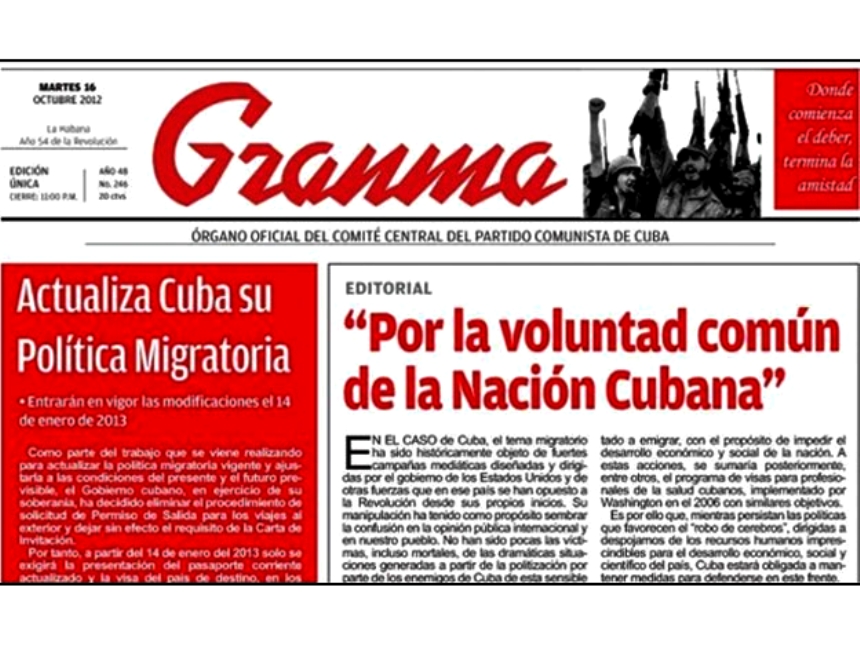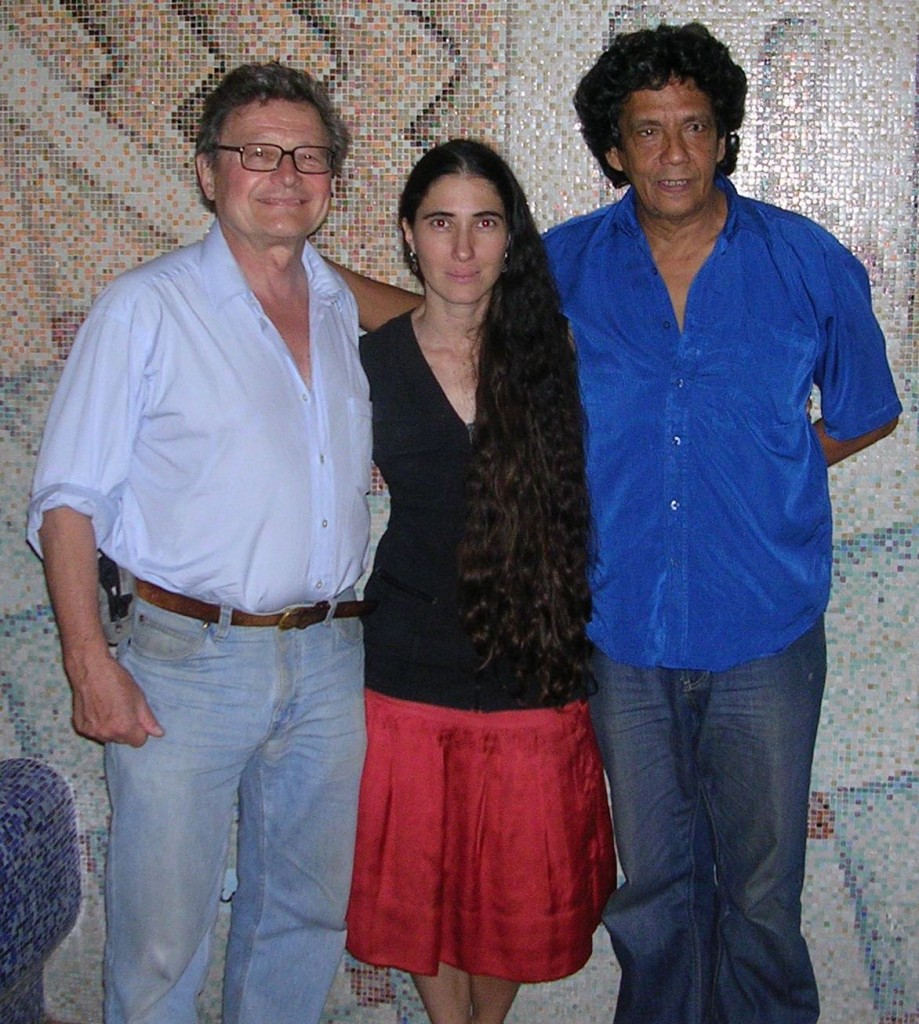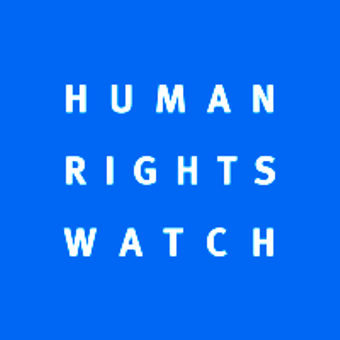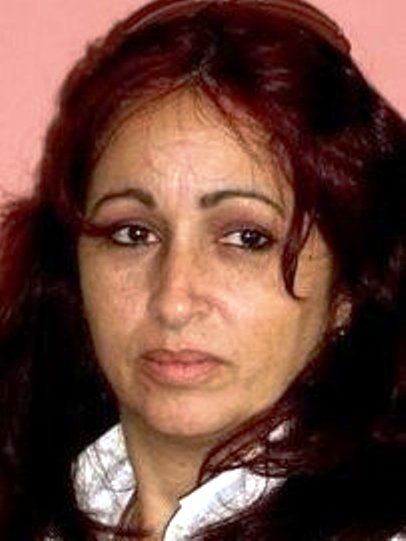By Juan O. Tamayo, Miami Herald, October 17, 2012
 The Cuban government’s bombshell decision to drop the widely hated exit permits required for citizens travelling abroad has unleashed “euphoria” on the island as well as concerns abroad over a possible mass exodus.
The Cuban government’s bombshell decision to drop the widely hated exit permits required for citizens travelling abroad has unleashed “euphoria” on the island as well as concerns abroad over a possible mass exodus.
A decree published Tuesday made it clear the communist government will continue to decide who can leave the island, as it has since Jan. 9, 1959. It repeatedly noted that any Cuban could be kept from travelling “when the proper authorities so decide.”
“But there is an incredible euphoria here because what 1 million or more people here really want is to leave” for good or just to visit relatives or friends abroad, dissident economist Oscar Espinosa Chepe said from Havana.
University of Miami professor Jaime Suchlicki warned of a “legal Mariel.” And a pro-Cuba activist urged Washington to avert a possibly massive increase in the number of Cubans arriving by ending its wet-foot, dry-foot policies and the Cuban Adjustment Act.
State Department spokesman William Ostick said Washington welcomed the changes because they favor human rights, but warned Cubans not to “risk their lives” crossing the Straits of Florida and noted that they still need visas to enter most nations.
“Now the question is where, where can we go to,” said Katarina Ponce, a recently laid off government secretary, trying to figure out if any countries do not require Cubans to obtain visas in advance of their arrival. “Russia? Cambodia? Any place.”
Havana blogger Yoani Sanchez, who has been denied exit permits more than 20 times, wrote on Tweeter that “The devil is in the details of the new migration law” and called the decree “gatopardista” — a situation where change is more apparent than real.
The new rules appear likely to allow more average Cubans — those without political or other issues pending with the government — to travel abroad more easily, stay out longer and return with fewer complications, costs and paperwork.
They also may help ease some of the social and financial pressures ballooning inside Cuba under Raúl Castro’s decisions to reform the economy by laying off nearly 1 million state employees and cutting subsidies to the food, health and education sectors.
More than 1 million Cubans now live abroad, mostly in the United States, and about 7,400 islanders without visas arrived in the United States in the one-year period that ended Sept. 30. All Cubans who step on U.S. soil can stay permanently.
The decree noted that as of Jan. 14, Cubans will no longer need the exit permits, which cost $150 in a country where the average monthly wage stands at $20. They also will not need letters of invitation from their foreign hosts, which cost $200 to process.
The changes also extend from 11 to 24 months the amount of time that Cubans can spend abroad before they are ruled to have officially migrated and lose benefits such as health care. Further extensions are possible.
But the government retains final say on who gets passports because U.S. migration policies that favor Cuban migrants “take away from us the human resources that are indispensable to the economic, social and scientific development of the country,” according to a report Tuesday in the Granma newspaper announcing the changes.
Supervisors must approve the issuance of passports to government and military officials, professionals, physicians and other medical personnel, top sports figures and others whose work is deemed “vital” to the state, according to the decree.
Passports also can be denied to any Cuban “when it is so determined by the appropriate authorities for other reasons of public interest,” the decree added, or when “reasons of defense and national security suggest it.”
“If that’s the way it is, then I have to believe that the government will be as arbitrary as always,” said Wilfredo Vallín, a Havana lawyer who heads the non-government Cuban Judicial Association.
Also barred from obtaining passports — whose price rose from about $60 to about $110 — are those who are subject to the military draft or have other unspecified “obligations” to the government.
“The government continues to regard migration not as a right of all Cubans but as a gift that it gives to people according to its own interests,” said Juan Antonio Blanco, a Florida International University professor who has studied Cuba’s migration regulations.
The decree also abolishes the reentry permit required for Cubans who live abroad and wish to visit the island, and extends the time they can visit from one month to at least three months per visit.
Not all will be welcomed back, however. Blocked are those who “organize, encourage or participate in hostile actions against the political, economic and social basis of the state,” and any others “when reasons of defense and national security call for it.”
Also on the don’t-come list, according to the decree, are those with criminal records for terrorism, money laundering or weapons smuggling, and those “linked to acts against humanity, human dignity (or) the collective health.”
“This continues the government effort to control the conduct of citizens inside and outside the island, through an opaque system that rewards and punishes at its own discretion,” said Blanco, a former analyst for the Communist Party’s Central Committee.
The migration reforms were the most anticipated of all the changes that Raúl Castro has been talking about and putting in place since he took over from older brother Fidel Castro, temporarily in 2006 and officially in 2008.
The exit permit was required in 1959 initially to block the escape of officials and supporters of the Batista government toppled by the Castro revolution just nine days before. The re-entry permit was required beginning in 1961, to try to control the return of radical Castro opponents.
But Raúl Castro told the nation’s legislature last year that Cuban migration policies needed an update because those leaving the country nowadays are “émigrés for economic reasons” rather than hostile exiles.
Suchlicki, head of the Institute for Cuban and Cuban American Studies at UM, on Tuesday reissued a column he wrote on May 3 warning that Castro was planning a mass exodus to relieve pressures inside Cuba. The column was titled, “Is Cuba planning a legal Mariel?”
John McAuliff, a New York activist who has long opposed the U.S. embargo on the island, also predicted that with more Cubans free to travel abroad, more will wind up in Mexico and Canada and will step across the U.S. border.
The Obama administration should therefore immediately end the wet-foot, dry-foot policy and the Cuban Adjustment Act, which allows any Cuban who sets foot on U.S. territory to stay permanently, and to remain, McAuliff wrote in an email.
Mauricio Claver Carone, executive director of the pro-embargo U.S.-Cuba Democracy Political Action Committee in Washington, remained skeptical.
When Cubans start jamming foreign diplomatic missions in Havana in search of visas and come up empty handed, he said, the Castro government will tell them, “Well as you can see, other countries also don’t want you to travel.”
Even more skeptical was Blanco. “When all this blows over, the Cubans and the media will realize that not much has changed in the tight control system,” he said. “Stalin can continue to sleep in peace.”










